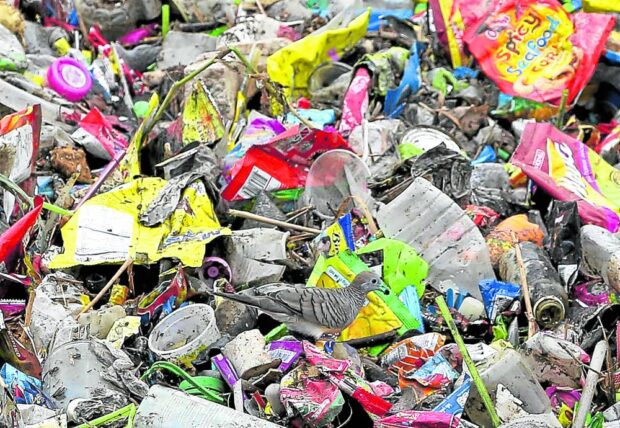
DOVE SPOTTING | A zebra dove scavenges for food among piles of garbage in a creek in Taguig City where the Metropolitan Manila Development Authority led a cleanup last week. According to environmental officials, the country generates up to 60,000 metric tons of solid waste daily. (Photo by RICHARD A. REYES / Philippine Daily Inquirer)
MANILA, Philippines — The amount of solid waste generated daily by Filipinos went up by 275 percent to 60,000 metric tons this year — enough to fill up around 24 Olympic-size swimming pools — compared to 16,000 MT in 2016.
Of the 60,000 MT of solid waste, plastic accounted for 30 percent to 40 percent, Environment Undersecretary Jonas Leones told reporters on Monday, which was also World Environment Day.
Environment Secretary Antonia Yulo Loyzaga, who led the celebration, lamented that the country was not winning the war against single-use plastics.
“There’s a social issue attached to it and if you cannot address the social issue, we will not be able to address the use of single-use plastics,” she said, calling on large-scale enterprises using plastic packaging to be responsible in looking for a sustainable replacement.
“It is not only the government and certainly not the community that is [leaning] to use it. Those who generated it should take responsibility in terms of their role in [eradicating] that,” Loyzaga said.
Under the Extended Producer Responsibility Act which lapsed into law last year, big companies should implement policies on the proper management of plastic packaging waste. However, only 600 out of 4,000 firms have taken steps to comply with the law.
To address the garbage problem, the Department of Environment and Natural Resources (DENR) is looking into prioritizing its programs for fast-moving consumer goods companies that are large generators of plastics.
It has also taken steps to ramp up the country’s waste management program with the National Solid Waste Management Commission’s approval of the 10-year solid waste management plans (SWMPs) submitted by 54 cities and municipalities.
The DENR’s May 2023 data showed that 1,263 out of 1,592 local government units (LGUs), or 79 percent, have approved SWMPs—a requirement under Republic Act No. 9003, or the Ecological Solid Waste Management Act of 2000.
Failure to implement
But delays in the preparation and approval of the plans were hampering their implementation, the Commission on Audit (COA) said in a report in April.
It observed that as of 2021, the country had just 11,637 material recovery facilities servicing only 39 percent of 42,046 barangays and 245 operational sanitary landfills servicing just 29 percent of 1,634 LGUs.
State auditors further noted that instead of reducing solid waste generation, the Ecological Solid Waste Management Act of 2000 failed to “progressively achieve its goal.”
“More than 20 years after the passage of RA 9003, [annual] solid waste generation in the country has steadily increased from 9.07 million MT in 2000 to 16.63 million MT in 2020,” the COA said. It projected that this could rise to 19.76 million MT in 2030 and 24.50 million MT in 2045.
The COA attributed the situation to the “frail” enforcement of and compliance with the law due to the political, financial and technical limitations of LGUs and implementing agencies.
For the international advocacy organization Oceana, it was high time the government banned single-use plastics, citing recent studies that confirmed the presence of microplastics in the environment.
“Plastic is an escalating crisis for the environment, health, and climate. If we don’t act now to mitigate its impacts, when will the government move? Banning single-use plastics with the utmost sense of urgency is a must now more than ever,” said Oceana acting vice president Rose Liza Eisma-Osorio.